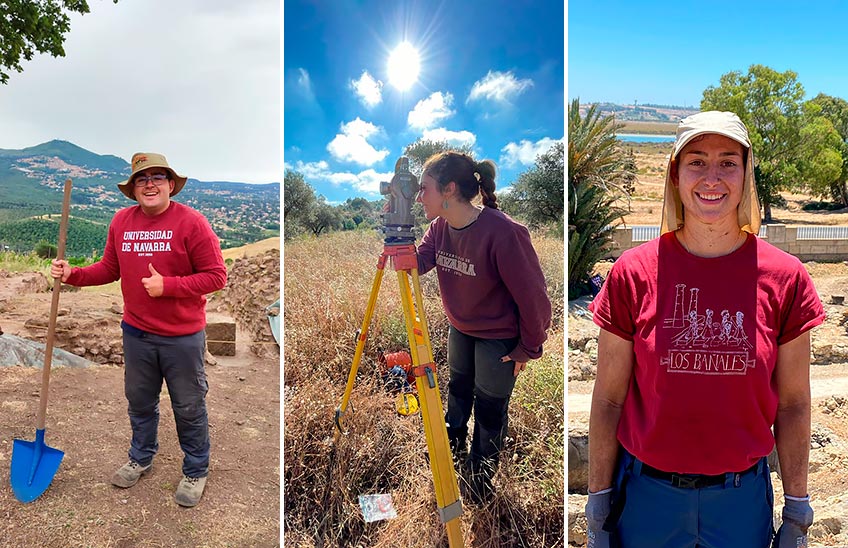A look at the past as a future career opportunity
Students from Degree in History and Diploma in Archaeology share their experience of internships at different sites.

FotoCedidas/Javier, at the Roman site of Tusculum (Italy); Carmen, at the Roman city of Idanha-a-Velha (Portugal); and Yarima, at the site of Lixus (Morocco).
28 | 07 | 2022
There are many students of the School of Philosophy and Letters who take advantage of the summer to put in internship the knowledge acquired in the classroom during the course. This is the case of Javier Martínez Sarasate, Carmen Gómez Margarito and Yarima Miranda, students of Degree in History and Diploma in Archaeology, who during the last few weeks have carried out internships at sites in Italy, Portugal and Morocco, respectively.
Javier Martínez Sarasate, a fourth-year student, traveled to Italy last June to excavate at the Roman site of Tusculum, an important Latin city located in the Albano Mountains, in the ancient region of Latium. "To have been able to live this experience abroad and more specifically in Italy, because of its historical importance, has been a great joy," he says. For a month, our student has participated in the XXV excavation campaign of the site, with the goal to contribute to know a little better the life of this Roman city. "We have worked in two sectors where we have performed different tasks, from agreement to the circumstances of each day: chopping, shoveling and sifting the earth, documenting the findings, drawing and photographing," he explains. He has been able to study theory at class and this experience has allowed him to put it on internship with a greater knowledge: "Although archaeology is a science eminently internship, it is necessary to know the theory well. Thanks to the classes, one knows the methods currently used in this discipline, how it has been developing, etc.".
Javier assures that this experience has not only been very enriching on a professional level, "because I have been able to deepen the knowledge acquired during the course and I have learned how to work on a site in another country, because the legislation regarding heritage changes depending on the area", but also personally: "I have met wonderful people. In the excavation there were Italians and Spaniards, from different latitudes, but with the same passion: history and archaeology. It was great. For all these reasons, he does not hesitate to recommend to other colleagues the possibility of spending the summer doing an internship. "It's true that after academic year you have to rest, because we deserve it, but doing an internship is a good way to disconnect, as well as taking the opportunity to do something you like and find out if you want to dedicate yourself professionally to it".
Of the same opinion is Carmen Gómez Margarito, who this course will begin her second year of degree program. "An archaeologist without field experience cannot be considered an archaeologist. One can study and know a lot about archaeology, but it is essential to be able to carry out the work of interpretation and differentiation of material or Structures, understanding the context that gives you the study. Theory and internship complement each other. Don't be afraid to step out of your comfort zone."
Carmen has had the opportunity to do an internship for two weeks in the Roman city of Idanha-a-Velha, in Portugal, at the framework of project Igaedis, which is run by the University of Coimbra. "Having been able to excavate in a Roman city like this, travel to another country and work with the University of Coimbra has been a reward for the course," he says. During this time, he has learned how to carry out archaeological work, interpret the ruins and prepare reports, among other things. He says that, despite having studied only a course in History and Archaeology, everything he learned this year has been able to apply it to the field of work: "The theory acquired financial aid to carry out a more professional work . Now I not only see things, but I see and understand what happened in that place so many years ago and how".
Yarima Miranda experienced the excitement of her first excavations a few years ago, when she started her programs of study in History and Archaeology. This year she will pass to the fourth year and with the professional world getting closer and closer, this summer she did not want to miss the opportunity to excavate in a site. In his case, in the Roman city of Lixus (Morocco). He says that this experience "is a dream come true, because excavating in such a place is a privilege that is not available to everyone". He is grateful to Professor Javier Andreu, director of Diploma in Archaeology, and to the University, "for the facilities when it comes to managing internships, training and preparing us for the future".
During the month of July, Yarima has also been able to put on internship the theory studied during this time and the skills acquired in the laboratory of Archaeology, "in addition to learning new things every day": cleaning of the materials found, classification, inventory, numbering of pieces, collection of dimensions, taking images with drones or photogrammetry are some of the tasks she has performed. "As always, in a campaign, you also learn to live with your colleagues, to work with them and to get to know other ways of working. In this case, I have also had the opportunity to get to know another culture," he adds.
